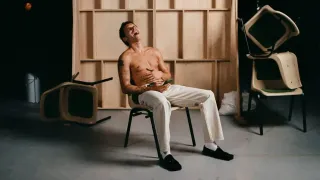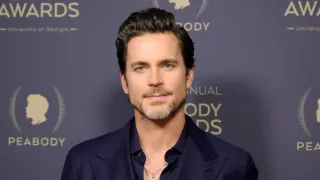September 21, 2023
Pedro Almodóvar Goes for a 'Different Kind of Sexy' with 'Strange Way of Life'
READ TIME: 4 MIN.
Pedro Almodóvar "has long been cinema's greatest sensualist, always eager to plunge headfirst into tales of bedroom acrobatics and familial psychodrama," writes the Independent in an interview with the Spanish master.
The interview concerns "Strange Way of Life," his half-hour gay western that created a stir at Cannes this past May and comes to theater next month on a bill with another Almodóvar experiment with short -form: "The Human Voice" starring Tilda Swinton. Taking together, they clock in at an hour. The double-bill opens in New York and Los Angeles on October 4, then a wider release on October 6 via Sony Pictures Classics.
"I've shot many sex scenes in my career, mainly in the Eighties," he tells the Telegraph, specifically noting the 1987 thriller "Law and Desire" (that starred his long-time collaborator electrifying Antonio Banderas in an electrifying performance). ""I was much younger then. It was the beginning of my career and I needed to do that – we were talking about desire, about carnal knowledge. It was necessary." Now, though? "I am much more interested in the nakedness of gazes and words – especially words that have never been heard in a Western before."
"Strange Way of Life" stars Ethan Hawke and Pedro Pascal as cowboys in the Old West who re-unite after 25 years apart. In the past, they had a sexual relationship, but went their separate ways; it turns out though, it isn't that sexual desire that is bringing them back together, and Almodóvar packs a lot in the film's short running time, including glimpse of Hawke and Pascal in the past, where they are played by Jason Fernández and José Condessa.
Many critics have commented on the palpable sexual tension between Hawke and Pascal, plus Almodóvar filled out the cast with numerous young hunks that underscore its queer themes.
"I wanted to see if I could do a different kind of sexy," the 73-year-old explains to the Telegraph, in his mischievous Spanish purr. "For example, that moment where Ethan is doing his bowtie, and he's staring at Pedro's butt with the bed right in the background... that was very erotic!"
Many have compared the film to "Brokeback Mountain," Ang Lee's 2005 film about the tortured relationship between two cowboys in Wyoming over the last few decades of the past century. In addition to the film being about gay cowboys, Almodóvar was involved in the development of "Brokeback Mountain" in 2001, but passed on the project.
Doing things differently has become the two-time Oscar winning writer/director's mantra over the past few years. "The Human Voice," a solo piece from a play by Jean Cocteau, is his first English-language film. But, he pointed out, the financing for both his short films came from Europe. He has yet to make a Hollywood film, and that may have something to do with how he sees the filmmaking process is viewed in the film capital.
"I have a specific way of working and my intuition has told me that it is not the way to work in Hollywood or with the studios," he says. "I mean, I am an artisan." He glides his hand over his desk. "Everything here, I make the choice. I do everything."
He continued, stressing how his personal approach would not work in Hollywood. "Even when you read [industry newspapers], they talk about the actors but not the directors. I mean, if you are Scorsese or Tarantino, you are there – but it seems to me that the director is just a part of the crew. It is a question of power. My sense is that the director in that system has a lot of voices that they need to hear. They'd have to listen to the producers, the actors – even the agents, in some cases. I don't feel that that would be a system in which I could work."
But how much does he bring his personal life into his films? "Years ago, he used to bridle at theories about his personal life," adds the Telegraph. "But now he's loosened up".
"At my age, I'm feeling more comfortable with interpretation," he says. "It's true that there's always been an autobiographical element hidden in my characters. That said, sometimes people are confused. Many, many journalists thought I was addicted to heroin, and I was not." Banderas's heroin-injecting filmmaker in 'Pain and Glory' was him, he says, but only up to a point. "I did know many people in the Eighties who were addicted because it was very popular back then. People don't believe me, though. The difference is that now I don't mind if they believe me or not."






